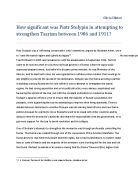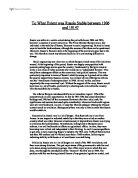In 1911 Stolypin was assassinated and, in the years 1911-1914, protests and strikes
1.
Around eighty percent of Russia’s population were peasants who lived in communities. Living and working conditions for most peasants were dreadful, famine and starvation were common. People worked for long hours, their wages were low and rent was high. In factory towns people lived in overcrowded slums and there were very few sanitary facilities. Poor living and working conditions existed all the way, while other causes of the Bolshevik seizure of power came in later on. Peasants wanted change, but they were not getting it. The peasants became furious and more issues got worse for them. Everything added up towards their dissatisfaction. The 1917 Bolshevik seizure of power would not have occurred had conditions not been so bad, however if this was the most important reason, the seizure would have occurred sooner.
The provisional government was led by, Alexander Kerensky, leader of social Revolutionary Party. Kerensky introduced many reforms e.g. freedom of speech and universal suffrage. Many of these reforms were popular. When the provisional government came into power a lot of things started to go wrong. Inflation grew worse and prices were ten times high, there were severe food shortages and peasants began to seize land from noble estates. However Kerensky made a crucial mistake by deciding to go on with the war, so he like the Tsar lost support of the army. The troops in Petrograd were now under the control of Soviets and refused to obey the government. All these factors allowed the Bolsheviks to make another bid for power. However this is not the most important reason for the Bolsheviks’ seizure of power as if they had not been ‘the appeal of Lenin and the Bolsheviks’, the provisional government would not have been at risk of being overthrown.







